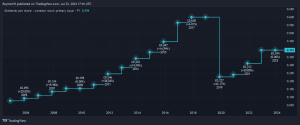Virginia state income tax rates are 2%, 3%, 5% and 5.75%. Virginia state income tax brackets and income tax rates depend on taxable income and residency status.
Virginia state income tax rates and tax brackets
|
Taxable income bracket |
||
|---|---|---|
|
$0 to $3,000. |
2% of taxable income. |
|
|
$3,001 to $5,000. |
$60 plus 3% of the amount over $3,000. |
|
|
$5,001 to $17,000. |
$120 plus 5% of the amount over $5,000. |
|
|
$17,001 and up. |
$720 plus 5.75% of the amount over $17,000. |
Do I have to pay Virginia state income tax?
Generally, you have to file a Virginia state income tax return if:
-
You’re a resident, part-year resident or nonresident, and
-
You’re required to file a federal tax return, and
Am I a resident for Virginia state income tax purposes?
There are three types of residency statuses when it comes to Virginia state income tax. They determine what portion of your income the state will tax.
Resident status rules
In general, you’re a resident of Virginia for income tax purposes if you were physically present there, lived there or had a place there (a “place of abode”) for more than 183 days (the days don’t have to be consecutive) during the tax year. Residents file Form 760.
Here are some examples of situations that can make you a Virginia resident for tax purposes, according to the state:
-
You spend more than 183 days in Virginia during the tax year.
-
You’re a resident of another state but go to college in Virginia.
-
You’re a resident of Virginia but go to college in another state.
Part-year resident status rules
Generally, you’re a part-year resident of Virginia if you were a nonresident for some of the tax year. This is often the case for people who moved to Virginia from another state.
If you’re a part-year resident, you typically pay Virginia state tax on all income you received during the part of the tax year you were a resident of Virginia, plus state income tax on income from Virginia sources while you were a nonresident. Part-year residents file Form 760-PY.
Nonresident status rules
Nonresidents still may have to pay Virginia state tax on income they receive from Virginia sources. This means you may need to file a Virginia state tax return even if you live in another state but made money from Virginia-related things such as:
-
Services performed in Virginia.
-
Rent from real estate you own in Virginia.
-
The sale or transfer of real estate in Virginia.
-
Income from a Virginia business, trade or profession.
Virginia Commuters. If you’re a nonresident of Virginia and you commute to Virginia from Kentucky or Washington, D.C., you don’t have to file a Virginia tax return if you don’t have a place in Virginia and your only income from Virginia is salaries and wages that are taxable in Kentucky or Washington, D.C.
If you’re a nonresident of Virginia and you commute to Virginia from Maryland, Pennsylvania or West Virginia, you don’t have to file a Virginia tax return if your only income from Virginia is salaries and wages that are taxable in Maryland, Pennsylvania or West Virginia.
Military Members. When it comes to service members, tax rules can get complex. In Virginia, members of the U.S. military who are legal residents of another state are generally classified as nonresidents, even if they’re stationed in Virginia for years. For more details, you can read about Virginia military tax rules, exemptions and relief.
What’s the filing deadline for my Virginia state income tax bill?
The deadline to file your 2020 individual income taxes in Virginia was the same as the federal tax deadline: May 17, 2021. If you missed the May due date, you may be able to take advantage of Virginia’s automatic extension, which gives most Virginia taxpayers until Nov. 1 — an additional 6 months — to file with no application required.
Remember though, a tax extension comes with a price tag if you don’t read the fine print. Extensions do not give you more time to pay your taxes; they only give you more time to file your return. If you’re going to take advantage of the extension, you will still need to pay your estimated tax bill by the original deadline in order to avoid late-filing penalties or interest.
The deadline for filing next year’s taxes — your 2021 return — is April 15, 2022.
6 things to know about Virginia state income tax
-
Tax software will do your state taxes, though sometimes for an extra fee.
-
Virginia has reciprocity with Kentucky, Maryland, Pennsylvania, West Virginia and Washington, D.C. That means Virginia residents with a “limited presence” in those states are taxed only by Virginia, and residents of the other states who have a limited presence in Virginia are only taxed by their home states.
-
If you can’t afford your tax bill and owe less than $25,000, Virginia offers payment plans that you can set up online or over the phone.
Find the tax relief company that’s best for you
We’ve weighed the pros and cons of some major players in the space.
|
|
|
This post was originally published on Nerd Wallet







